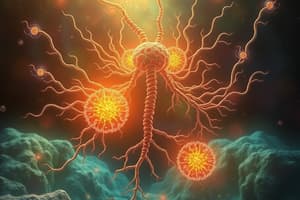Podcast
Questions and Answers
Fermentacija yra ______ procesas, kuris konvertuoja biocheminę energiją iš angliavandenių, riebalų ir baltymų į alkoholį ar pieno rūgštį be deguonies.
Fermentacija yra ______ procesas, kuris konvertuoja biocheminę energiją iš angliavandenių, riebalų ir baltymų į alkoholį ar pieno rūgštį be deguonies.
metabolinis
Fermentacija vyksta ______ ląstelėse, kur saugoma angliavandenių energija verčiama į ATP ir kitus aukštos energijos junginius.
Fermentacija vyksta ______ ląstelėse, kur saugoma angliavandenių energija verčiama į ATP ir kitus aukštos energijos junginius.
citruplazmoje
Yra du pagrindiniai fermentacijos ______: alkoholinė fermentacija ir pieno rūgšties fermentacija.
Yra du pagrindiniai fermentacijos ______: alkoholinė fermentacija ir pieno rūgšties fermentacija.
tipai
Alkoholinė fermentacija yra procesas, kuriuo mielės konvertuoja cukrų į ______ ir anglies dioksidą.
Alkoholinė fermentacija yra procesas, kuriuo mielės konvertuoja cukrų į ______ ir anglies dioksidą.
Signup and view all the answers
Laktinio rūgšties ______ atlieka svarbų vaidmenį įvairiuose biologiniuose procesuose, įskaitant raumenų susitraukimą ir energijos gamybą.
Laktinio rūgšties ______ atlieka svarbų vaidmenį įvairiuose biologiniuose procesuose, įskaitant raumenų susitraukimą ir energijos gamybą.
Signup and view all the answers
Fermentacija turi daugybę taikymo sričių įvairiose ______ šakose, įskaitant maisto ir gėrimų gamybą, mediciną ir biotechnologiją.
Fermentacija turi daugybę taikymo sričių įvairiose ______ šakose, įskaitant maisto ir gėrimų gamybą, mediciną ir biotechnologiją.
Signup and view all the answers
Alkoholinių gėrimų gamyboje fermentacija yra būtinas procesas, tokių kaip alus, vynas ir stiprieji gėrimai.
Alkoholinių gėrimų gamyboje fermentacija yra būtinas procesas, tokių kaip alus, vynas ir stiprieji gėrimai.
Signup and view all the answers
Fermentuotų maisto produktų, tokio kaip raugintų kopūstų, kimčio ir jogurto, gamyboje naudojami fermentacijos procesai, kurie pagerina jų mitybinę vertę ir ______.
Fermentuotų maisto produktų, tokio kaip raugintų kopūstų, kimčio ir jogurto, gamyboje naudojami fermentacijos procesai, kurie pagerina jų mitybinę vertę ir ______.
Signup and view all the answers
Study Notes
Biology
Biology is a diverse and complex field that encompasses numerous subtopics, including but not limited to cell biology, genetics, ecology, and biochemistry. One such subtopic is fermentation, which plays a crucial role in various biological processes and is essential for understanding the transformation of biological materials.
What is Fermentation?
Fermentation is a metabolic process that converts biochemical energy from carbohydrates, fats, and proteins to alcohol or lactic acid in the absence of oxygen. It is an anaerobic process that occurs in the cytoplasm of cells, where the energy stored in carbohydrates is converted into ATP and other high-energy compounds. Fermentation is carried out by microorganisms such as yeast, bacteria, and archaea, which break down organic compounds to produce energy and other by-products.
Types of Fermentation
There are two main types of fermentation:
-
Alcoholic Fermentation: In this process, yeasts convert sugars into alcohol and carbon dioxide (CO2). It is a form of anaerobic respiration that occurs in the absence of oxygen, and it is an essential part of the brewing process for producing beer, wine, and other alcoholic beverages.
-
Lactic Acid Fermentation: This type of fermentation occurs in the absence of oxygen, and it is carried out by bacteria and yeasts. It is the process by which glucose is converted into lactic acid, which is then used by the body for energy. Lactic acid fermentation plays a crucial role in various biological processes, including muscle contraction and energy production.
Applications of Fermentation
Fermentation has numerous applications in various industries, including food and beverage production, medicine, and biotechnology. Some of the key applications include:
-
Alcoholic Beverages: Fermentation is an essential process in the production of alcoholic beverages such as beer, wine, and spirits.
-
Bakery and Confectionery: Fermentation is used in the production of bread, cakes, and other baked goods to improve their texture and flavor.
-
Fermented Foods: Fermented foods such as sauerkraut, kimchi, and yogurt are produced through fermentation processes that improve their nutritional content and shelf life.
-
Medicine: Fermentation is used in the production of various medications, including antibiotics and vaccines.
-
Industrial Production: Fermentation is used in the production of enzymes, organic acids, and other chemicals, which are used in various industries such as textiles, paper, and plastics.
Conclusion
Fermentation is an important subtopic within the field of biology, as it plays a crucial role in various biological processes and has numerous applications in various industries. Understanding the concepts of fermentation, its types, and its applications can provide valuable insights into the world of biology and its practical applications.
Studying That Suits You
Use AI to generate personalized quizzes and flashcards to suit your learning preferences.
Description
Learn about the process of fermentation in biology, including its types and applications in various industries. This quiz covers the metabolic process of fermentation, its significance in biological processes, and its practical applications in fields such as food production, medicine, and biotechnology.



